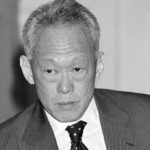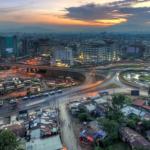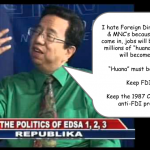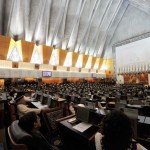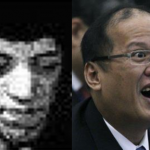
by Mark A. Galang, originally posted in his blog on (posted with author’s permission)
I just found these definitions of “Filipino” at the Urban Dictionary:
http://filipino.urbanup.com/2315108
http://filipino.urbanup.com/1397824
I find these definitions to be hilarious. These also got me into thinking again of what really is a Filipino. Is it a state of being that I have to be proud about like many Pinoys would be? In a lot of ways I would not be. The damaged retrogressive culture that permeates into mind and soul of the typical Juan is something that I do not desire for myself.
Having vicariously (I say vicariously as I have never traveled outside of the Philippines) seen and experienced other Asian cultures, I would have to agree that Filipinos have little to do with being Asian. F. Sionil Jose even goes to proclaiming that the Filipino is not Asian. Culturally speaking, Filipinos have so much more in common with Latin Americans and the Spanish than with the Japanese, Koreans or even Thais. The sad fact is that Filipinos seem to have inherited everything negative about Spanish culture that keeps Filipino society from moving towards progress. Things like Mañana habit (procrastination), ningas cogon (the inability to finish what was enthusiastically started), advancement through connections rather than skill (Padrino system); the “pwede na yan” (that’ll do) mentality of mediocrity; the abuse of amor propio, delicadeza,and utang na loob (indebtedness); and the grip of Roman Catholicism all get in the way of progress of the Filipino society. Such culture has given way into the chaotic state that the Philippines is. Seems like the Pinoy is a creature and lover of chaos that is easily entertained and driven by emotion rather than the intellect.
If you go study the history of the Philippine Islands closely, you might arrive at the conclusion that the concept of being a Filipino originated from Creoles i.e. people of Spanish descent who were born in the Philippines. There are claims that these Creoles co-mingled with the dominant Tagalog tribe (and perhaps with some wealthy businessmen of Chinese descent), established their own government in defiance of Spain (getting inspiration from the French and American Revolutions), and placed their seat of power in Manila. Other tribes of the island could care less. There is one site in particular that goes to a great depth about this topic called “The Nation of Don Rafael Ibarra” if you’d like to read more about it.
It really appears that three centuries of Spanish rule have made Filipinos dumb to the point that there are claims of the Philippines having a collective IQ of only 87. It doesn’t really surprise me given the fact that during the last presidential elections, the Philippines elected a president based on sentiment rather than competence.
The lack of collective achievement as a people is bothersome. Apparently, this is due to having too much freedom with too little discipline, something that former Singaporean prime minister Lee Kuan Yew had said before. Having too little discipline is readily observable in the Philippines; just try driving at EDSA and the streets of Manila and you’ll know what I mean.
One aspect of Filipinos that continues to drive me crazy in this information age is the fact while Filipinos have admirable work ethic as a hardworking people, they do not appear to be smart about it. I am a freelance worker who’s registered at oDesk, and it appears to me that the trend amongst Filipinos is to drive prices down. It is what I call “nagtratrabaho ng palugi” (working at a loss). Granted that labor is supposed to be cheaper in the Philippines, should that mean that the Filipino’s way of competing with the rest of the world is just through low prices rather than competence? I believe that despite our flaws as a society, the Filipino in this global society is worth much more.
Allow me to give an example. I currently work freelance taking on music and audio jobs. Whenever I apply for a job, I occasionally look into profiles of other contractors. I have noticed that some of these other Filipino contractors price themselves at miserably low rates. I see Filipino freelance musicians at oDesk charging as low as $1.00 an hour for composing music or writing a jingle. This is lower than Philippine minimum wage! (around $1.50/hour) A service like writing music should cost much more than that given how taxing and mentally challenging the process is in the first place (plus the potential value of a jingle as intellectual property). How I thought that Filipinos are very proud of the fact that they are musically inclined! Shouldn’t they ask for more given the fact that they’ve got musical and audio production skills that can compete at the international level? Although it’s virtually unavoidable to take cheap jobs in order to gain higher feedback ratings (and higher rates eventually), why should such workers remain at such a miserable hourly rate? I’d assume that they don’t families to support and they’re still living off their parents. If you look into the salary trends in the medical/general transcription sector in oDesk, the rates are even more miserable.
Going back to those Urban Dictionary definitions, I would have to agree with one post that says “A hard working, industrious, and very strong family oriented people, but notoriously useless at organizing anything beyond chaos as a nation of people.” It hits the point right at home. As an example of that, take a look into Filipino fiestas. Many Filipinos would rather incur enormous debt just to host a party and look good in the community during feast days for pagan gods and goddesses, all of which have been draped with a “Christian” veneer as Santo this and that by the Roman Catholic Church. They’d rather keep on having sex and have as many as 10 children just right after hitting middle age despite lacking the financial resources to properly raise such offspring. No wonder that the Philippines has a collective IQ of 87. Is acting stupid a thing to be proud of? Apparently, many proponents of “Filipino pride” think so.
It’s very sad that Filipinos always think of themselves as small, the underdog so to speak that’s incapable of dreaming big. Despite all the negative things about the Filipino culture, I still would like to believe that Filipinos as a people should be capable of achieving greatness. Examples of these are the many Filipinos who have great individual achievements inside and outside of the country, all of which are mostly earned through a disciplined and frugal approach of living. My parents are a good example. Starting from virtually nothing, they worked their way to acquire assets that currently serve as financial security for themselves. I also happen to have an aunt who works two blue collar jobs in Australia, enabling her to invest some of that money into property and enjoy in the Philippines whatever is left over. Former waiter and security guard turned restauranteur Larry Cortez is another. My wife grew up from a below poverty state and is now making great strides up the corporate ladder at the moment. Why is it that such Filipinos are exceptions to the norm rather than the standard?
I would go to say that Juan has to change his way of thinking in order to succeed, to give value to competence and logical thought rather than emotion and mediocrity. I also do hope that some day this statement would true within the Philippines itself rather than just abroad:
“Most Filipinos are upper middle class. Day know how to budget der money and make lots ob sacripices like staying in da Naby por 20 years so day can get a retirement.” (source: http://www.urbandictionary.com/define.php?term=Filipino&defid=2315108)
It’s unfortunate that this kind of Filipino is more readily observable in the United States, Australia and anywhere else that has become locations for the Filipino Diaspora. Outside of the gated community where I reside, I usually see Filipinos who are living below the poverty line, incapable of budgeting given the fact that many are in debt, unable to make sacrifices because of the addiction to parties and entertainment, and would eventually retire with a huge debt and a mentality of mendicancy. The Philippines is really home to a fractured culture of people who claim to be Asian yet Hispanic in thinking and afflicted by still existing tribal divisions and a plutocracy that doesn’t care at all.
In a lot of ways I would be ashamed to be a Filipino. I often feel that I lack affinity with what a typical Filipino would want. I’m not a fan of Filipino cuisine, and I have no taste whatsoever for the mainstream OPM scene. I hate Pinoy telenovelas and noontime TV shows simply because they promote stupidity, mediocrity and mendicancy. I don’t watch local TV channels. Call it colonial mentality or whatever but if something is excellent, I have great appreciation for it, and for the most part a lot of things found overseas are leagues away from what is found locally in the Philippines.
However, whenever I see and hear about exemplary individuals such as my wife, my parents, composers Angel Matias Peña and Jose Maceda, restaurateur Larry Cortez and others, I appreciate the fact that Filipinos can be capable of breaking away from the typical Filipino slacker mentality.
Mark A. Galang wrote the article above on his own blog and merely sought to express his own candid observations of what’s wrong with the Philippines and the Filipino. He is actually a professional musician, a pianist and guitarist and music arranger and composer, and appears to be his musical background that is the reason for his attention to detail and his ability to articulate his observations very well. We were able to get his permission to feature his blog entries in our website. As of September 2013, he is on his way to completing a Master of Arts major in Music Education at the music department of the Philippine Women’s University.
Mark A. Galang’s piece above represents the starting point for understanding a lot about what is wrong about Filipino culture and what it is that keeps the Philippines from progressing. We from the CoRRECT™ Movement all started off from the same kind of dissatisfaction with what’s wrong in the Philippines and same desire to find ways to improve our country.
Our search for answers and solutions is what brought us to arrive at our pro-Constitutional Reform push. Because as it turns out, Filipino Culture’s dysfunctions stem from system issues. Systems like the tropical environment, the economic system, the political system, and many other “norms” that make up the “default” way that Filipinos often do what we do.
This is why system change is extremely important if we are serious about improving “Filipino Culture”, and system change can only happen through Constitutional Reform. We obviously cannot change the fact that the Philippines is in the tropics and that this fundamental fact is largely responsible for many of the dominant aspects of Filipino Culture outside of whatever foreign influences we absorbed from groups who came from non-tropical backgrounds, but we can at least change the way our economic and political system work.
Currently, we have an economic system that is largely based on monopoly and protectionism rather than one that is truly based on having options. We also have a political system of government that is based on a combination of personality politics, popularity and name-recall, patronage, and personal allegiances rather than allegiances to ideas. Simply shifting away from the current status quo to an economic system where economic opportunities are numerous in-country and towards a system of government where personal popularity & name-recall are no longer the prime determinants of who wins but rather platform, programmes, and competence will go a long way into changing the way Filipinos act and yes, even think. These will be the first shifts that will later turn into a real cultural shift.
Think about the entry of numerous foreign direct investors and multinational corporations. Forget the common Leftist/Communist (LFS, CPP-NPA, Bayad Muna) rhetoric about them being evil. The fact is, they create jobs. They will hire Filipinos, and they will train those Filipinos. And they won’t train them to do things the way Filipinos do what they do. They will train their employees to follow global and international standards of safety and quality. Filipino employees who adapt to these requirements will be rewarded with continued employment, salary raises, and promotions… Those who refuse to change their ways will get fired.
Even local Filipino companies will be forced to change the way they do what they do. If in the past, a feudalistic overly hierarchical structure is what these local companies were used to, the competitiveness of MNCs in the Philippines will force the local Filipino companies to have to start adopting ways of doing things that make better business sense and change the way Filipino employees in those Filipino companies act if those local companies are serious about competing against the MNCs. Contrary to the dinosauric opinions that Pinoy Far-Leftists and Pinoy “Nationalists'” claim that “the entry of FDIs and MNCs will cause local Filipino companies to lose out”, the real Truth is that the entry of FDIs and MNCs will actually force local Filipino companies to change their ways, do things better, become more competitive, and even succeed on the global stage — something they would never have thought of or done under the old paradigm of Pinoy Economic Protectionism.
But as Mark A. Galang’s article above has shown, some of the Pinoy dysfunctional cultural traits are just too strong that they are the reason that people who would actually benefit from Constitutional Reform refuse to even consider it.
In our campaign to promote Constitutional Reform, we continue to encounter small-minded and unanalytical Filipinos who instead of trying to understand the proposals we are advocating, they just immediately dismiss Constitutional Reform and even come up with deliberate misinterpretations aimed at justifying their wrong decision to stick with the status quo. It’s as if many Filipinos are almost “hard-wired” to resist positive improvements and just stick to the status-quo by default, even if it is such a lousy status quo.
Between watching a lousy noontime show with gyrating scantily-clad go-go dancers and, say, watching a documentary about how Singapore used to be a poor country in the 1950’s and was easily able to become Asia’s richest country in terms of GDP per capita in less than 50 years, most ordinary Pinoys will go with the former. This is the kind of lousy default choice that Pinoys seem to tend to make such as when choosing between a more open economic system where FDIs and MNCs can easily come in and create jobs versus sticking to the closed, and protectionist status quo, narrow-minded Pinoys will say “What about the local businesses? Bringing in Foreign Investors will wipe them out!” and thus support the protectionist status quo, even if the status quo means high unemployment and low wages. And so the lousiness continues…
(In contrast to the belief that FDI means that local companies will lose out, John Gokongwei himself welcomes Foreign Investors because as a true businessmen, he says that more players means more customers, more choices of partners and suppliers… Who says all MNCs are necessarily competitors?)
Laziness seems to be the overriding reason for all this complacency and lack of progress. Laziness to think and analyze. Laziness to read up and do research. Laziness to go beyond the normal range of what all ordinary Pinoys are used to. This self-limiting trait is what keeps Filipinos from progressing.
And in the end, the Filipinos who want a better life for themselves end up just giving up and emigrating permanently to other countries. Why? Because they see that whatever reforms meant to improve the Philippines just never get implemented. Ordinary Filipinos are just too lazy to read up so they end up ignorant about what needs to be done, while the supposedly more intellectual elites are infected by ego issues that causes some of them to refuse to acknowledge ideas or proposals that are superior and end up arguing for an impossible perfect solution that doesn’t exist and all the results is the continuation of the rotten status quo.
This editor (Orion) has already seen large numbers of his own friends – some of the most gifted and most intellectually astute Filipinos he knows – leave the Philippines and emigrate to other countries to adopt citizenship elsewhere. Who is he to blame them for leaving? They have the right to give themselves and their families a better life. Well, this push for Constitutional Reform is our “Hail Mary Pass…” A kind of “suntok sa langit” (last ditch effort) of not giving up without a fight.
But we are merely human and there may be a point at which we will have to give up and move on — to greener pastures. When that happens, no Filipino can and will fault us for having done nothing to try to improve the Philippines for this is exactly what the CoRRECT™ Movement is trying its darndest best to achieve: Constitutional Reform & Rectification for Economic Competitiveness & Transformation.
Alas, unless we fight and defeat Pinoy Ignorance, unless we fight Pinoy Stupidity, unless we fight Pinoy Laziness, and unless we overpower the wrong ideas and the wrong attitudes that dominate Pinoy Culture, the Philippines will continue to remain the shameful and embarrassing country that it unfortunately continues to be: (1) a country where its people are forced to find employment abroad in order to send remittances back because jobs are scarce thanks to the Constitution’s and laws’ anti-FDI restrictions, (2) a country where only the Capital seems to have any real economic activity thus keeping the rest of the country impoverished and forcing migrants from the rest of the country to crowd themselves into the Capital, and (3) a country where the system of government guarantees that the ignorant and lazy-to-think majority end up continuing to vote for candidates on the basis of name-recall and popularity and not based on platform and competence.
There is a basis for some hope as there are now more people who support Constitutional Reform according to the CoRRECT™ Three Point Agenda of (1) Economic Liberalization, (2) Evolving Federalism, and (3) Shifting to the Parliamentary System. But there are still ignoramuses and lazy Pinoys out there who hate to read and are out to spread false information against our campaign to fight for a better Philippines.
We must fight those naysayers head-on, defeat them in debates, crush them so that they realize that they have no cause in spreading wrong information, and spread the word about the benefits of Constitutional REform far and wide so that more Filipinos learn about what needs to be done to fix the Philippines!
CoRRECT™ the Constitution!

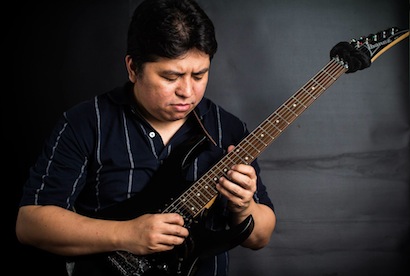
 I believe: This is a CoRRECT™ Video with a very positive message
I believe: This is a CoRRECT™ Video with a very positive message Walang Natira: Gloc-9's MTV Rap about the OFW Phenomenon
Walang Natira: Gloc-9's MTV Rap about the OFW Phenomenon